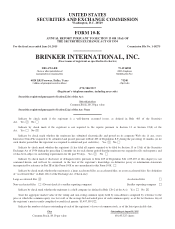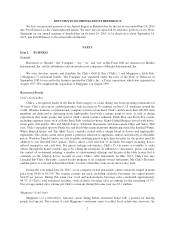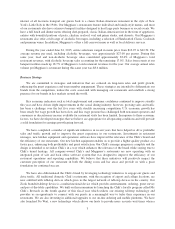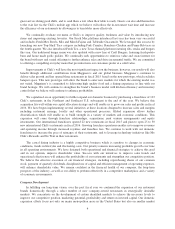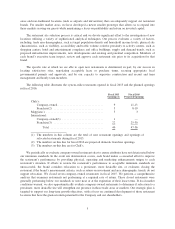Chili's 2015 Annual Report Download - page 17
Download and view the complete annual report
Please find page 17 of the 2015 Chili's annual report below. You can navigate through the pages in the report by either clicking on the pages listed below, or by using the keyword search tool below to find specific information within the annual report.investigations or litigation. We do not expect to incur material costs from compliance with the provision of the
Affordable Care Act requiring disclosure of calories on the menus, but cannot reliably anticipate any changes in
guest behavior resulting from implementation of this portion of the law, which could have adverse effects on our
sales or results of operations.
Each of our company-owned and our franchisees’ restaurants is also subject to licensing and regulation by
alcoholic beverage control, health, sanitation, safety and fire agencies in the state, county and/or municipality
where the restaurant is located. We generally have not encountered any material difficulties or failures in
obtaining and maintaining the required licenses and approvals that could impact the continuing operations of an
existing restaurant, or delay or prevent the opening of a new restaurant. Although we do not, at this time,
anticipate any occurring in the future, we cannot be certain that we, or our franchisees, will not experience
material difficulties or failures that could impact the continuing operations of an existing restaurant, or delay the
opening of restaurants in the future.
We are also subject to federal and state environmental regulations, and although these have not had a
material negative affect on our operations, we cannot ensure this will not occur in the future. In particular, the
U.S. and other foreign governments have increased focus on environmental matters such as climate change,
greenhouse gases and water conservation. This may lead to new initiatives directed at regulating an unspecified
array of environmental matters. These efforts could result in increased taxation or in future restrictions on or
increases in costs associated with food and other restaurant supplies, transportation costs and utility costs, any of
which could decrease our operating profits and/or necessitate future investments in our restaurant facilities and
equipment to achieve compliance. Further, more stringent and varied requirements of local and state
governmental bodies with respect to zoning, land use and environmental factors could delay, prevent or make
cost prohibitive the continuing operations of an existing restaurant or the development of new restaurants in
particular locations.
Due to our international franchising, we are also subject to governmental regulations throughout the world
impacting the way we do business with our international franchisees and joint venture partners. These include
antitrust and tax requirements, anti-boycott regulations, import/export/customs and other international trade
regulations, the USA Patriot Act and the Foreign Corrupt Practices Act. Failure to comply with any such legal
requirements could subject us to monetary liabilities and other sanctions, which could adversely impact our
business and financial performance.
The impact of current laws and regulations, the effect of future changes in laws or regulations that impose
additional requirements and the consequences of litigation relating to current or future laws and regulations, or
our inability to respond effectively to significant regulatory or public policy issues, could increase our
compliance and other costs of doing business and therefore have an adverse affect on our results of operations.
Failure to comply with the laws and regulatory requirements of federal, state and local authorities could result in,
among other things, revocation of required licenses, administrative enforcement actions, fines and civil and
criminal liability. Compliance with these laws and regulations can be costly and can increase our exposure to
litigation or governmental investigations or proceedings.
Shortages or interruptions in the availability and delivery of food and other products may increase costs
or reduce revenues.
Possible shortages or interruptions in the supply of food items and other products to our restaurants caused
by inclement weather, natural disasters such as floods, drought and hurricanes; the inability of our suppliers to
obtain credit in a tight credit market; food safety warnings or advisories or the prospect of such pronouncements;
animal disease outbreaks (such as the avian flu outbreak in the midwestern U.S. in 2015); or other conditions
beyond our control, could adversely affect the availability, quality and cost of items we buy and the operations of
our restaurants. Our inability to effectively manage supply chain risk could increase our costs and limit the
availability of products critical to our restaurant operations.
11


